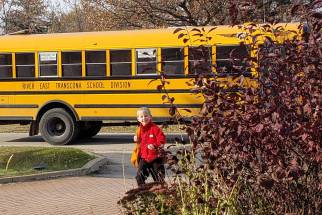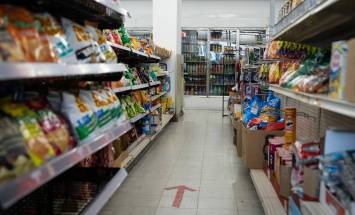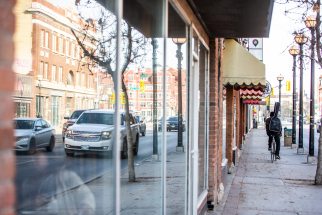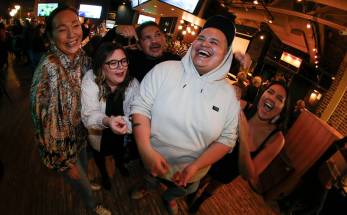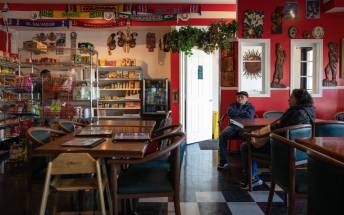Go big and go home Anishinaabe comedian Paul Rabliauskas embraced life on the rez to create his semi-autobiographical CTV comedy series, Acting Good
Read this article for free:
or
Already have an account? Log in here »
To continue reading, please subscribe:
Monthly Digital Subscription
$0 for the first 4 weeks*
- Enjoy unlimited reading on winnipegfreepress.com
- Read the E-Edition, our digital replica newspaper
- Access News Break, our award-winning app
- Play interactive puzzles
*No charge for 4 weeks then price increases to the regular rate of $19.00 plus GST every four weeks. Offer available to new and qualified returning subscribers only. Cancel any time.
Monthly Digital Subscription
$4.75/week*
- Enjoy unlimited reading on winnipegfreepress.com
- Read the E-Edition, our digital replica newspaper
- Access News Break, our award-winning app
- Play interactive puzzles
*Billed as $19 plus GST every four weeks. Cancel any time.
To continue reading, please subscribe:
Add Free Press access to your Brandon Sun subscription for only an additional
$1 for the first 4 weeks*
*Your next subscription payment will increase by $1.00 and you will be charged $16.99 plus GST for four weeks. After four weeks, your payment will increase to $23.99 plus GST every four weeks.
Read unlimited articles for free today:
or
Already have an account? Log in here »
Hey there, time traveller!
This article was published 20/10/2022 (1143 days ago), so information in it may no longer be current.
On the day he pitched his television pilot at the Bell headquarters in Toronto, Paul Rabliauskas felt as out of place as he looked. His meeting with the executives coincided with the taping of a fashion segment for the The Marilyn Denis Show, so in the lobby next to him was a lineup of beautiful models, waiting to strut down the catwalk.
Rabliauskas, an Anishinaabe comedian from Poplar River First Nation, was wearing his standard uniform: a pair of Air Jordans, a fitted baseball cap — size 8, the biggest hat New Era sells — and an inside-out black T-shirt, which had been splattered by chipotle sauce.
“I’d never felt more like a rez kid,” he says.
He went upstairs and wound up in a hallowed space to which few comedians — and far, far fewer Indigenous comedians — are granted entry. Throughout television history, much the same as Canadian history, Indigenous life had been treated not just as secondary, but tertiary, or even quaternary, in the grand scheme of entertainment. For every 1,000 hours of Canadian scripted television, it wouldn’t be a stretch to guess that the equivalent of roughly one commercial break featured an Indigenous character as a central focus — not as an outsider, not as a villain, not as a token, not as a background character, not as a cameo and not as a punchline.
Paul Rabliauskas noticed. He watched a lot of TV. “You don’t get a physique like mine without it,” he says. He loved the erudite, family-driven humour of Frasier. He loved the dramatic flair and timing on display in the squared circle of professional wrestling, which Rabliauskas believed was real until the Native American heel Tatanka teamed up with the wrestler Irwin. R. Schyster, known as IRS.
JOHN WOODS / WINNIPEG FREE PRESS Tina Keeper, producer and actor, Amber-Sekowan Daniels, co-creator and co-show runner, Gabriel Daniels, actor, Paul Rabliauskas, creator, writer and actor and Roseanne Supernault, actor, at a viewing party of the pilot of Acting Good.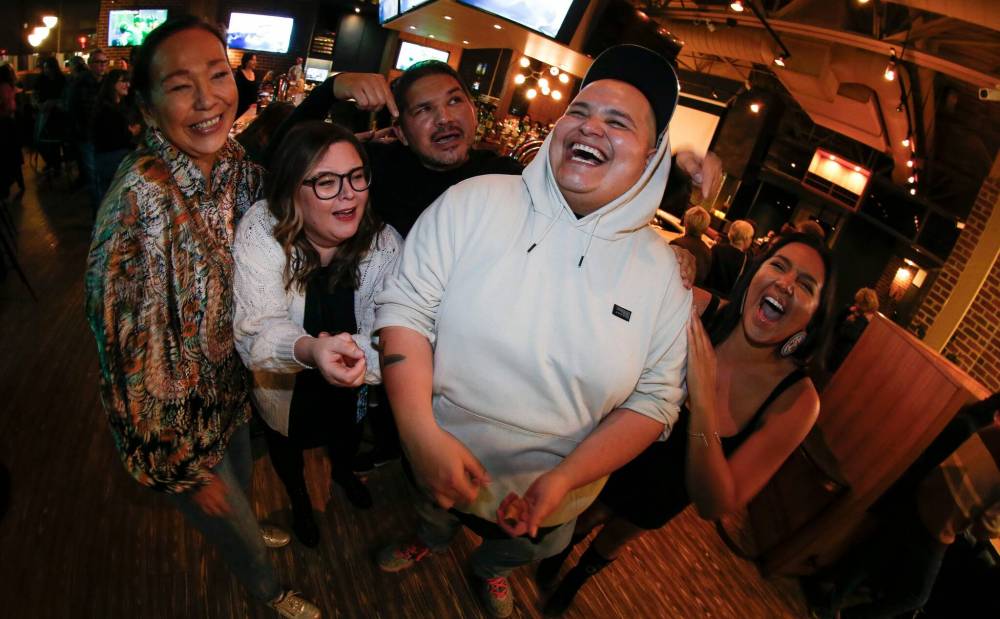
“Natives weren’t supposed to pay taxes,” Rabliauskas jokes. “That’s when I figured out wrestling was fake.”
An elder once told Anishinaabe journalist Duncan McCue that the only way an Indigenous person would make it on the news is if he or she were “one of the four Ds: drumming, dancing, dead or drunk.” McCue originally passed that reduction off as simplistic, but soon looked deeper. “Those four Ds sure do show up an awful lot,” he told journalism site J-Source in 2013. In fictionalized television, the Ds showed up, too.
“We were either invisible or we were outsiders to the central narrative,” says theatre director and actor Michael Greyeyes, who comes from Muskeg Lake Cree Nation and played Gooch in Dance Me Outside.
The 1994 film, set on a reserve in Ontario, caused a 10-year-old Rabliauskas to have an awakening in the theatre.
“I couldn’t sleep that night,” he says. “I was so inspired and just wanted to write. I saw I could do it too.”
He got a similar feeling from the Canadian program North of 60 when he saw a character pulling up to a store on a Ski-doo. His parents let him and his siblings stay up late to watch the show, which starred Tina Keeper. Rabliauskas’ gears started turning as he saw his own face in the reflection of the television screen.
“I couldn’t sleep that night. I was so inspired and just wanted to write. I saw I could do it too.”–Paul Rabliauskas
Thus began Rabliauskas’ dream of making a show set in Poplar River, the fly-in community where he grew up. He wanted there to be one store, one white guy, and tons of real scenarios inspired by his own life and his own family. He wanted to show viewers that people like him were more than a comedic prop. He didn’t want it to be sad or traumatic or “important.” He just wanted it to be funny.
In his stained T-shirt, Rabliauskas sidled into the boardroom, joined by Eric Toth, Amber-Sekowan Daniels and Pat Thornton, each of whom had experience making a big pitch. Rabliauskas was nervous, but the ice was shattered when Toth’s chair broke. “We had them laughing before the meeting started,” Rabliauskas recalls.
After the windup came the pitch: a sitcom about a young man who returns to his fly-in reserve after failing to make it big in the city of Winnipeg. There would be a doting mother, a tough-as-nails sister, a cousin who’s more like a brother, a white Northern Store manager, some up-to-no-good teenagers, characters with nicknames like Mayonnaise and Worm and Football Head, and a lot of humour that Canadian viewers had never before seen.
The executives listened intently, and told Rabliauskas and company they would have an answer soon.
Two days later, a Saturday in 2019, the network ordered a script for the pilot for the show that would become Acting Good.
The chipotle stain didn’t bother them.
Rabliauskas is pronounced Ra-Blouse-Kiss. It’s a big name fit for a big man, which is exactly what the 38-year-old is. But if his figure is imposing, wait for his smile. “He’s just this absolute teddy bear,” Pat Thornton says.
Thornton was in Winnipeg a decade ago, working on a sketch show called Sunnyside, when he showed up to a few open mics. One comic stood out.
“Paul was just dominating everywhere. He was the king of every room I went in.” He and Toth were floored. “You know who should have his own show? Paul Rabliauskas.”
As a comedian, Rabliauskas is as nimble as they come. He can take a room’s temperature within seconds of beginning to speak. He can create laughter with a subtle arch of his eyebrows. Though he’d never say so, he is similar to the late Patrice O’Neal, who stretched silence and his face to deliver perfectly timed punchlines sometimes as simple as “Wow.” Rabliauskas’ reactions are grand and unmissable.
“Paul was just dominating everywhere. He was the king of every room I went in.”–Pat Thornton
One of his best bits is asking his mostly white audiences at local shows if they have dogs. He then asks if they were adopted from a rez. Someone always says yes.
At a September show at the Handsome Daughter, Rabliauskas told the crowd about a related interaction with a white person. “‘Paul, it’s Truth and Reconciliation Day coming up’ and she said, ‘Our dog is from the rez. So we’re going to give him a reaaaaal special day.’ I was like, yo… I think your dog forgot about the rez a long time ago. I think that happened as soon as you made him wear that sweater.”
He has the ability to appear off-the-cuff, even as he spends the bulk of his time writing or thinking about comedy. “He works as hard as anyone I know,” says Mike Green, a Winnipeg comedian and friend who began his standup career at the same time as Rabliauskas.
Rabliauskas had taken theatre in elementary school and at St. John’s High, where he appeared as the chef in The Nutcracker. As a teen, he was a co-host of the APTN series Cool Jobs, alongside an actor named Gabriel Daniels. Rabliauskas then went to broadcasting school. He didn’t pass, and wandered toward open mics around 2009, earning $10 to $20 a gig. It was fun, but it wasn’t enough to live on.
JOHN WOODS / WINNIPEG FREE PRESS Rabliauskas was nervous to see the reaction, but laughter echoed around the room.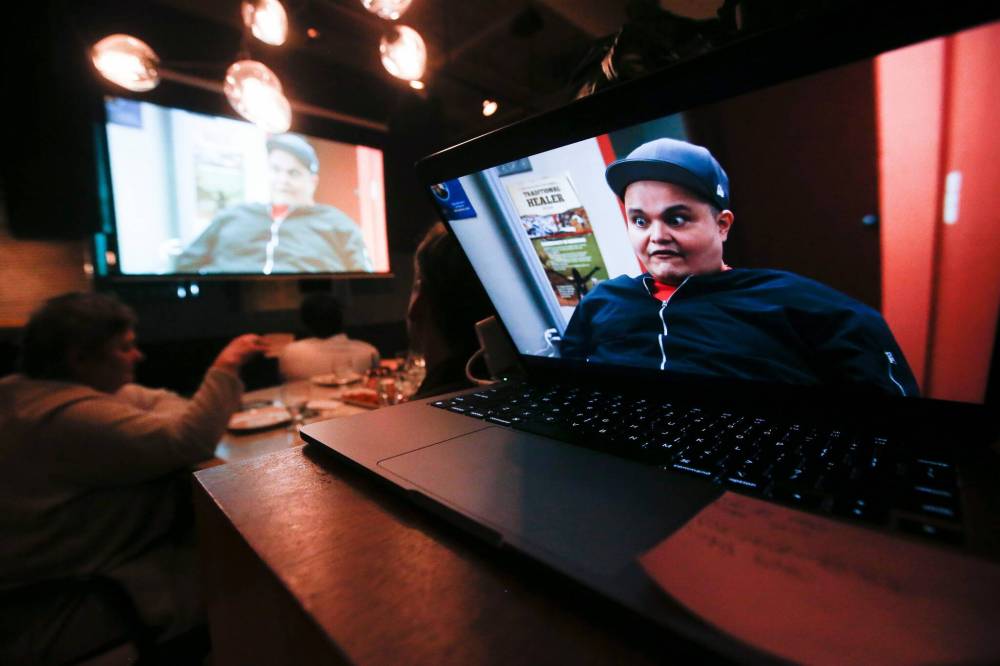
He was living in Manitoba Housing with his girlfriend, and every day would walk to the labour office looking for short-term employment in his work boots. “Nobody wanted a fat roofer,” he says. Confident and carefree on stage, Rabliauskas was demoralized and embarrassed by his struggles in the city.
A fortunate break came when radio DJ Miss Melissa Spence of the defunct hip-hop station Streetz 104.7 caught a set. She invited Rabliauskas for a guest spot on air. “I was trying very hard to impress her,” he says. “I needed them to miss me when I wasn’t on.”
Rabliauskas was a hit, and was soon waking up each day at 5:30 a.m. to drive to the station for the early morning show in his black Chevy Cruze. He worked at Streetz for a few years before the station disbanded in 2014, with his girlfriend supporting him during his layoff. He then got a gig on NCI FM, an Indigenous country station, hosting the afternoon show. He was feeling steady.
Then, a breakup, accompanied by weight gain, depression and a lot of doubt.
At that point, he decided it was time to go home.
Rabliauskas may joke about the place he grew up, but in describing the fly-in reserve on the northeastern shore of Lake Winnipeg, he makes Poplar River sound like Eden. “Whenever I’m there, there’s a feeling of safety and community that you just can’t get in the city.”
He told his friends in Winnipeg he went back to take care of his mom and dad. “In reality, they were taking care of me,” he says.
Every cameo Rabliauskas has made in the city has been followed by an intermission in Poplar River. During the pandemic, he returned home again, leaning on cousins and relatives as the comedy world hit pause. He got a job at the band office with the lands department, where his dad had worked. He started an Anishinaabemowin podcast with his mother.
“I know it sounds cheesy, but I could feel my ancestors in Poplar and I could feel a connection to the land I was living on. Every time I go back, I always get a little bit stronger.”–Paul Rabliauskas
Meanwhile, his television show was up in the air. Who knew if the network would still back it? Who knew if shooting a series in a First Nation would be possible, or even responsible, as COVID-19 spread? What had only a few months earlier seemed certain was suddenly anything but.
So Rabliauskas had to put his dreams on hold and moved into his cousin Oliver’s house, which in a way, turned out to be a blessing. “I know it sounds cheesy, but I could feel my ancestors in Poplar and I could feel a connection to the land I was living on. Every time I go back, I always get a little bit stronger.”
In the summer of 2021, Rabliauskas was teaching writing to summer students in Poplar when his phone started ringing. He picked it up and put it on speaker for the kids to hear.
Acting Good had been greenlit for production by CTV.
He handed in his two weeks’ notice to the chief. Rabliauskas had never been so excited to quit something, or to start writing.
Over Zoom, the writers toiled over the pilot, in which Paul crawls back from Winnipeg to the fictional fly-in reserve of Grouse Lake First Nation, where he’s seen as somewhat of a big shot. But those who know him best see right through the charade: Rabliauskas’ character is a man defeated, not a winning player returning to town with the Stanley Cup. He’s acting good, meaning he thinks he’s too good for the place he was born.
When it came time to cast the show, the showrunners knew that the most important characters would not be named Paul Rabliauskas; the ensemble would be the glue holding the show together. It would also represent for many actors their first shot at a legitimate TV role.
JOHN WOODS / WINNIPEG FREE PRESS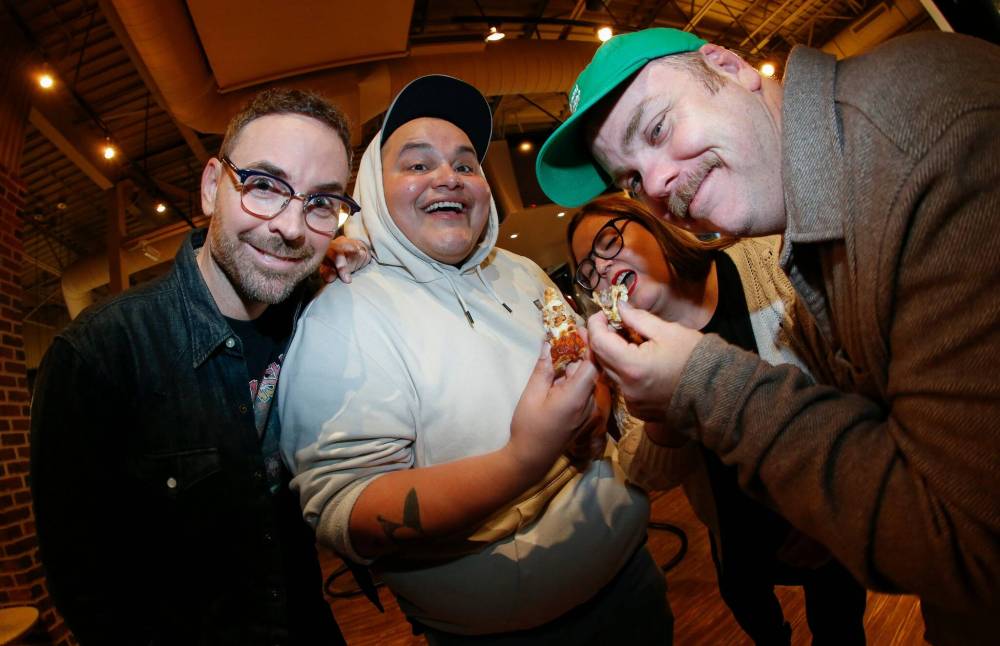
Thornton was cast as Brady, the sweet, oafish white guy who runs the Northern Store. Roseanne Supernault became Jo, Paul’s assertive sister. Avery Sutherland, who only has one other credit on IMDb, was chosen for Paul’s niece Chickadee. And the veteran actor and writer Billy Merasty was selected for the narrator role of radio host Roger Laughingstick. Cheyenna Sapp was an easy choice for Paul’s love interest, Rose.
When it came time to cast Paul’s best friend and cousin, Dean, Rabliauskas’ old friend Gabriel Daniels was the unanimous decision. His mother would be played by none other than Tina Keeper, whom a young Rabliauskas watched on North of 60 in the 1990s.
“A role like this had never come my way in television, especially in comedy,” says Keeper, whose Kistikan Pictures produced the show with Buffalo Gal Pictures.
“A role like this had never come my way in television, especially in comedy.”–Tina Keeper
“We’ve (Indigenous actors) been in a bubble in a way, and we’ve tried to break through into mainstream television and film but there was not really an opportunity. There were systemic obstacles that kept a lot of Indigenous and BIPOC (Black, Indigenous and people of colour) people at large out. I did North of 60, and that was a breakthrough project because there had never been a predominantly native cast on a television show in Canada. But it’s been 30 years. The opportunity for Indigenous artists to be themselves is now being really supported.”
JOHN WOODS / WINNIPEG FREE PRESS Tina Keeper, producer and actor at a viewing party of the pilot of Acting Good with cast, crew and friends at a Corydon Avenue pub on Monday.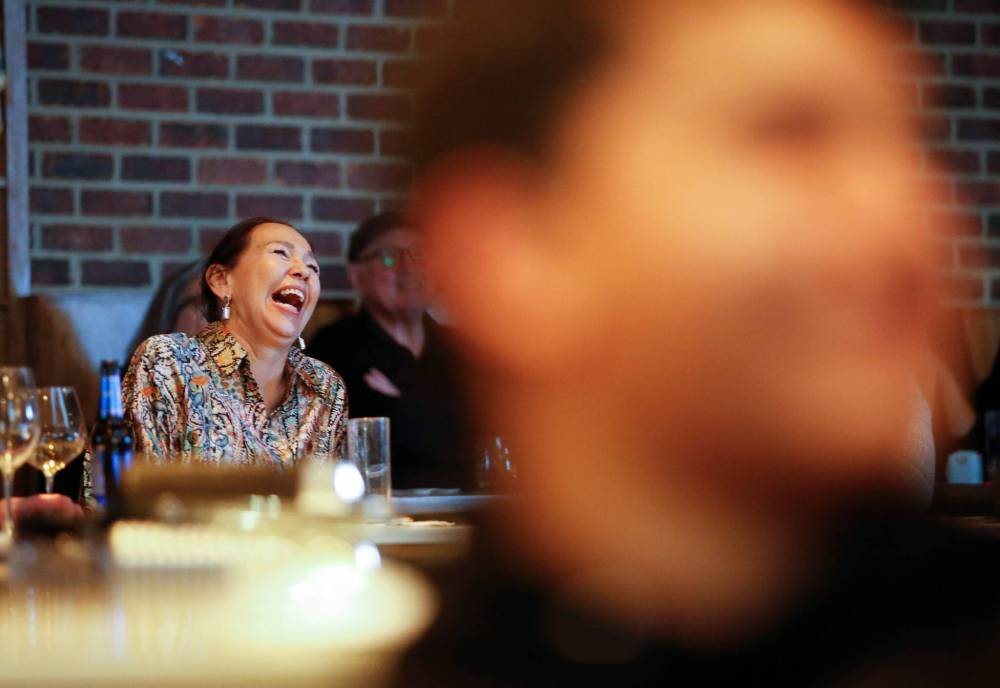
In the U.S., in particular, series such as FX’s Reservation Dogs and the now-cancelled Peacock series Rutherford Falls were two of the biggest shows of the past year, says Michael Greyeyes, who starred in the latter and directed five episodes of Acting Good, including the pilot.
“In the past few years, Indigenous creators have taken the reins, as it were, in terms of our narrative sovereignty,” says Greyeyes. “And in that time, I think the world has realized we don’t want to tell tragic stories. We want to tell stories about triumph and hopefulness, and of course, humour.”
As the series was being shot in Brokenhead First Nation during the summer, Greyeyes said those were the exact qualities he saw in Rabliauskas, who has an undeniable charisma and energy. “When he’s in the scene, he can put the show on his back and carry it. It’s exciting to work with that kind of potential.”
As the pilot’s air date neared, Rabliauskas headed to Toronto to race through his press junkets. He did interviews on national and local radio, and with the Winnipeg media, speaking so much that he lost his voice. But not before appearing on the CTV-produced The Marilyn Denis Show. He told the host about his anxious experience next to all the beautiful women as he waited for his appointment with Bell executives a few years earlier. “Now, I’m the fashion model,” he told her, live on air.
JOHN WOODS / WINNIPEG FREE PRESS Paul Rabliauskas (centre) with cast, crew and friends at a viewing party of the pilot of Acting Good.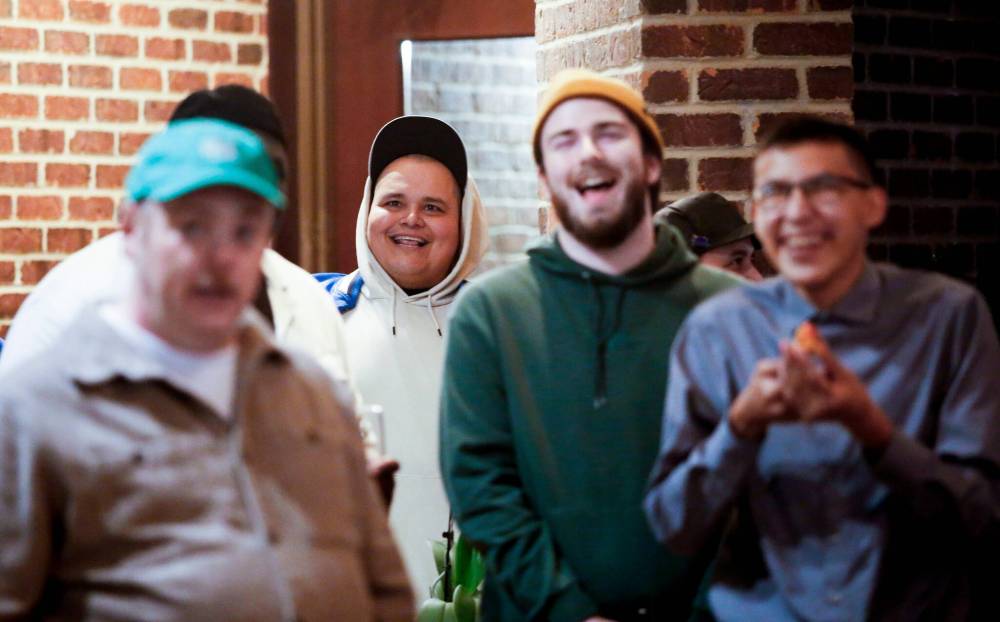
The night the first episode aired, Acting Good’s producers rented out a Corydon Avenue pub. Most of the cast was there, as was most of Rabliauskas’ family. His 17-year-old nephew Aiden was in awe of Uncle Paul. Rabliauskas’ closest friends from the local comedy circuit waited patiently for the pilot to start.
Meanwhile, Rabliauskas, in a clean white hoodie, a size 8 cap, Air Jordans and a blue sateen Blue Jays jacket, paced around the room. He was shaking hands and smiling, but feeling nervous about the reception of this thing he’d spent his whole life working toward.
His voice still raspy from the press tour, he tried to get everyone quiet before airtime, but couldn’t, so Daniels piped in. “Everybody shut up!”
Paul’s mother Sophia smiled as her son did the same onscreen. Every joke — especially one where a white lady named Karen gives a land acknowledgement during a seminar at the Grouse Lake community centre — landed. So did the appearance of the highly apologetic new boyfriend of Paul’s ex, cheekily named Stephen Harper.
Rabliauskas stood back in a daze as the laughter echoed.
ben.waldman@winnipegfreepress.com

Ben Waldman covers a little bit of everything for the Free Press.
Our newsroom depends on a growing audience of readers to power our journalism. If you are not a paid reader, please consider becoming a subscriber.
Our newsroom depends on its audience of readers to power our journalism. Thank you for your support.

